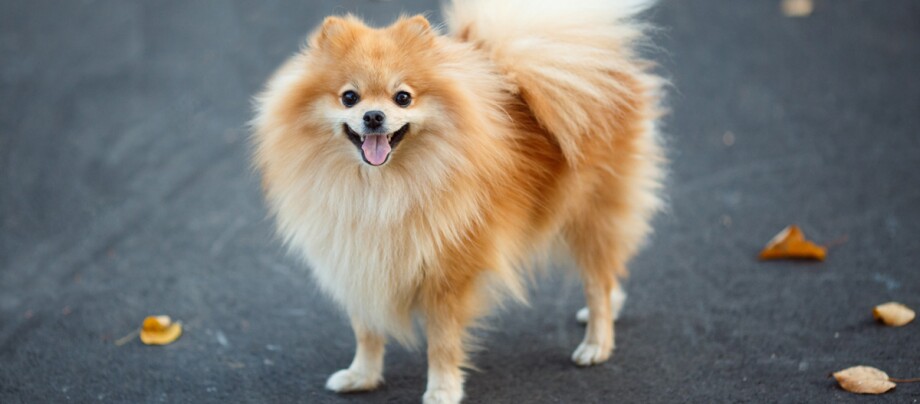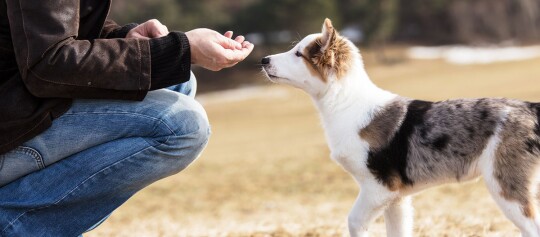The lively Pomeranian - small, but definitely a handful
26.02.2024 - Reading time: 8 minutes

Small, bubbly and exuberant ball of four with four legs: Pomeranians are an extremely popular breed as companion and family dogs. The reasons for this are clear: These cute little dogs with trustworthy looking face and large button eyes are very self-assured and intelligent creatures with a cheerful nature that, when well trained, make their humans very happy.
- What is the difference between a dwarf spitz and a Pomeranian?
- Character of the Pomeranian
- Profile
- Training and looking after a Pomeranian
- Is a Pomeranian a family dog?
- Care of special features of the Pomeranian
- Are Pomeranians “yappy” dogs?
- How much does a Pomeranian puppy cost?
- What to consider when looking to buy a Pomeranian puppy
- What do I need to buy for a Pomeranian?
- How much space does a Pomeranian need?
What is the difference between a dwarf spitz and a Pomeranian?
The success story of the dwarf spitz begins 200 years ago. Spitz dogs of exceptionally small sizes were bred in the German region of Pomerania. This is the origin of the English name for the dwarf spitz: the “Pomeranian”. This small spitz breed disappeared in Germany, being exclusively bred in Great Britain. They experienced a revival in Germany in the 1970s. Since then, the Pomeranian has been growing in popularity. This is hardly surprising – this cheerful breed has many advantages. Various Pomeranian mixed breeds are now also becoming popular. One such mixed breed is the Pomeranian-husky mix, known as the “Pomsky” or “Huskarian”. This mixture has not yet been recognised as its own breed. The characteristics and size expressed by a dog of this mix is not predictable, as is the case for most mixed breed dogs.
Character of the Pomeranian
The Pomeranian is a very affectionate, loving breed that is very fond of people, but can be quite demanding when it comes to training. While Pomeranians are not particularly heavy, weighing at most 4.5 kg, they like to see themselves as the defender of the whole family. They can make plenty of noise in this role. The Pomeranian is also considered one of the most loyal breeds of its kind. Its focus on people is a characteristic that is appreciated by many fans of this breed. Once a Pomeranian becomes attached to a person they will not easily let them go. They will effortlessly draw you in with their playful, friendly and sprightly behaviour.
NewsletterPomeranian
Breed | Pomeranian |
Origin | Germany |
Classification | Guard dog and companion dog |
Size | 20 to 22 centimetres shoulder height |
Weight | 3 to 4.5 kilograms (average 3.5 kilograms) |
Physique | square, harmonious, fox like |
Eyes | almond shaped with soft brown tones |
Ears | pointed, upright and close together |
Coat and colour | lush coat with thick undercoat, common colours are black, white, orange and cream |
Special features | likes people, distinctive coat with a very small size |
Character | affectionate, playful and very self-confident |
Care | brush weekly to prevent fur from matting |
Health | Tendency to problems knees, heart and lung |
We have the best products for your Pomeranian!
Training and looking after a Pomeranian
As a breed that is bursting with self-confidence, it is important to correctly train Pomeranians. Attending a dog training school is indispensable for inexperienced owners. The protective instincts of the Pomeranian and their attachment to their owners means they can display mistrust towards others, particularly towards other dogs. It is therefore important to expose them to other dogs in puppy playgrounds or in dog parks early on. This is ensure they become properly socialised. If you adopt an older Pomeranian, you will both benefit from attending dog training sessions. Bear in mind that plenty of patience and love is necessary to get the desired behaviour from your Pomeranian. The keyword here is consistency. Use plenty of positive reinforcement and praise to bring about the right behaviour.
As Pomeranians are very attached to their owners, you should avoid leaving them alone for too long. Teach your Pomeranian to spend time alone while they are still a puppy so that they get used to not always being able to see you. These dogs are keen to learn and also very much enjoy intelligent, dog-friendly games. Clicker training is a good opportunity to challenge your Pomeranian.
Is a Pomeranian a family dog?
As a outgoing, friendly and playful animal, Pomeranians make excellent family dogs. Their characteristic desire to protect means that they will get along well with their humans – even if they overdo it sometimes. They generally get along well with children and other dogs. Ideally, you should introduce them to other pets while still a puppy. Things can be more difficult when an adult Pomeranian is introduced into a new home with other animals. As with any dog, successfully integrating them into the family requires consistent, loving training.
Care of special features of the Pomeranian
Pomeranians have a thick undercoat that requires regular brushing. This will prevent their fluffy fur from matting. This small spitz breed is also susceptible to problems with the knees, lung and heart. Regular check ups at the vet are therefore essential.
Are Pomeranians “yappy” dogs?
Despite their small size, the lively Pomeranian is full of self-confidence and has quite a big mouth. Pomeranians indeed tend to like barking and yapping. With appropriate training, however, this behaviour can be controlled. Do not shy away from getting help from a professional dog trainer if you cannot get your dog’s barking under control. Undesired behaviours over a long period can harm your relationship and reduce the pleasure of spending time together – for both you and your dog.
How much does a Pomeranian puppy cost?
How much a Pomeranian costs can vary from breeder to breeder. On average, you can expect to pay around 1,000 euros for a Pomeranian puppy. If you are looking to buy a Pomeranian puppy, the price should not be the only consideration.
What to consider when looking to buy a Pomeranian puppy
When buying a Pomeranian, you should pay close attention to selecting a responsible Pomeranian breeder. How to recognise a responsible breeder? There are various things to look out for. Animal protection legislation requires all breeders to have a breeding permit – this includes Pomeranians. One sign of a reputable breeder is that they keep their animals within their own living areas. They will show you not only the puppies, but also their mother. Naturally, the puppies and mother should still be together.
Another thing that identifies a reputable breeder: They will never give away their puppies before they are at least twelve weeks old. This ensures that they place importance on ensuring the healthy social and psychological development of the puppies. A further good sign is when the breeder doesn’t try and push you into buying a dog. Ideally, you should be able to visit the puppies several times before deciding to buy. Good breeders will also take time to patiently and competently answer your questions about how they breed the animals. A good breeder will provide appropriate veterinary care, explain the necessary precautions you should take for the health of the dog, and has already had them wormed and microchipped. Once you decide to take one of their puppies, the breeder will give you a vaccination card and a pedigree certificate.
Never buy a Pomeranian puppy (or any other animal) from a dealer who shows you an animal in an unusual, anonymous location such as a car park or shed. Be sceptical of any breeder who refuses to let you meet the other animals or the mother of the puppy. Do not buy an animal in dubious circumstances purely out of sympathy for the animal. These people are often illegal puppy breeders who are interested only in the money and do not care for the wellbeing of the animals.
What do I need to buy for a Pomeranian?
You will not need any special equipment for a Pomeranian puppy. You can buy in the same equipment and accessories as you would for any dog. This will include things such as a lead and collar, or ideally a chest harness in the correct size, a comfortable dog bed, food and water bowls and a few toys. A dog brush for keeping their fur nice is also a good idea. Once the Pomeranian puppy arrives in your home, you will need to get in special puppy food for small breeds. Ask you vet if you are unsure which type of food is right for your new furry friend. Even if your Pomeranian is in top condition, it is still a good idea to have your vet check them over. You will generally also get important information about how things you should do to keep your dog in good health. A puppy will meet the vet on their first visit and can get used to the situation without any stress. You can also get them used to the idea of vet visits at home by carefully looking into their ears and mouth and rewarding them with a small treat for letting you do this. This will make vet visits much easier later on.
How much space does a Pomeranian need?
Pomeranians are not fussy when it comes to space. Of course, like other dog breeds, they will need plenty of exercise, play and things to do. Pomeranians, as small dogs, do not need huge walks over many kilometres. Several short walks in a local park are sufficient. If you would like to train the mental and physical fitness of your small furry friends, dog sports such as agility training, obedience training or dog dancing are great for Pomeranians. The training intensity should be kept moderate for this breed. Sporty activities are not just good for the health of your dog, but will also intensify and strengthen your relationship with one another!

